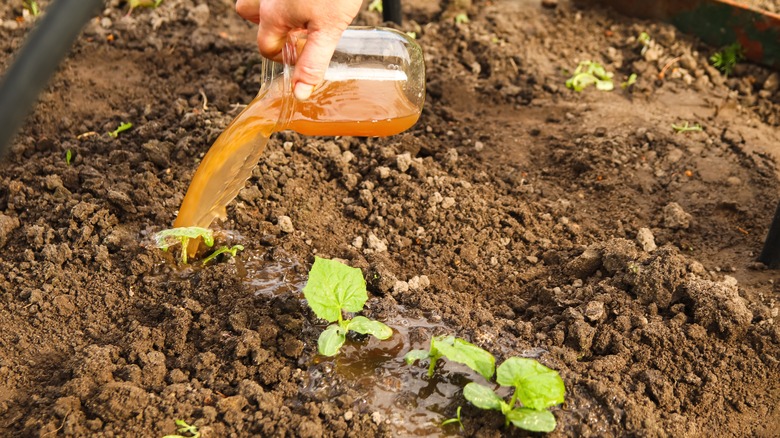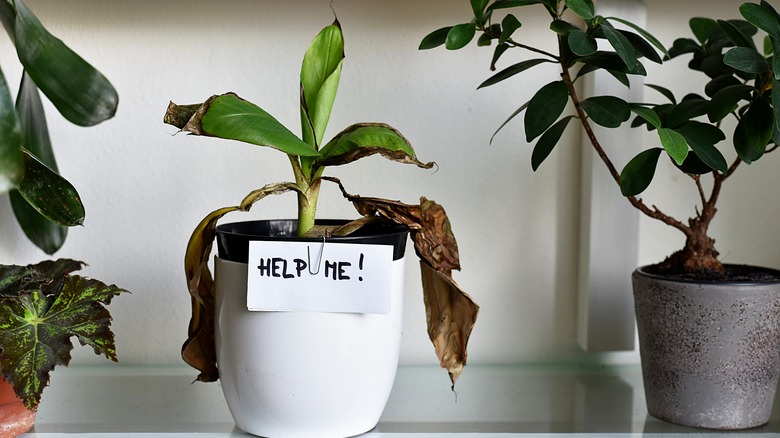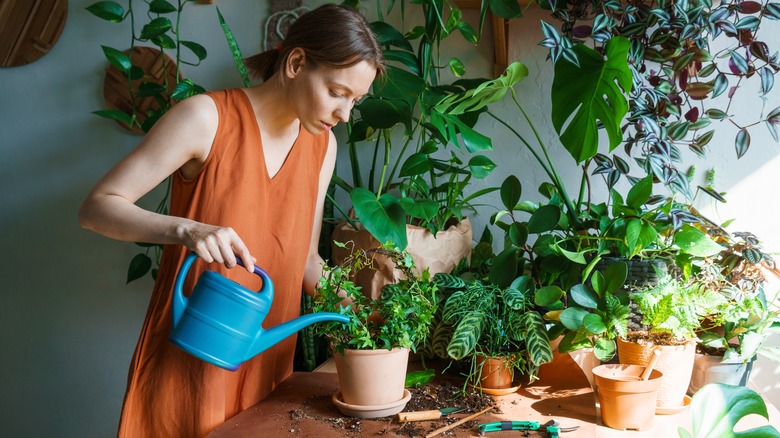Why You Should Think Twice Before Trying This Viral DIY Plant Fertilizer
Gardening is a rewarding hobby. However, when your plants are struggling and you aren't sure why their leaves are turning yellow, it can become stressful. In this situation, many turn to the Internet to try and diagnose the issue. While there is a lot of good gardening information available online, the issue is that the Internet is also full of viral gardening hacks many of which do more harm than good (like the Coca-Cola weed killer hack). One recent gardening hack to make waves online is an oatmeal and tea fertilizer. This hack claims that steeping the contents of a tea tag and a tablespoon of oats in hot water will create a liquid that can add nutrients to your plants without the need to use chemical fertilizers.
According to Creative Explained on YouTube, this trick works because it makes a "magical potion packed with nitrogen" and, because nitrogen is essential for plant health, this liquid can "boost the growth of your plants." But, as it turns out, while steeped oats and tea aren't necessarily bad for your plants, they aren't the best thing either. So, here's why you should think twice before pouring an oatmeal and tea potion on your plant babies.
The downsides of oats and tea
Out of the two ingredients in this viral fertilizer, tea is probably worse than oats. This is because most plants prefer alkaline soil and tea contains tannins that make soil more acidic. Therefore, steeped tea is best reserved for plants that prefer low-pH soils like blueberries, bleeding hearts, rhododendrons, holly, magnolias, and dogwoods. However, you should be careful when adding steeped tea — even to acid-loving plants — because it also contains aluminum, fluorine, and manganese as well as caffeine all of which aren't great for plants and can stunt their growth.
Oats, while probably the best of the two ingredients, also have a downside. Although this nutrient-dense food has been used by home gardeners as fertilizer since the early 1900s, the main downside of using it to help your plants is that it simply isn't as effective as chemical fertilizer. In fact, according to plant expert Vladan Nikolic in an interview with Architectural Digest, even a cup of oats wouldn't have nearly as many nutrients as store-bought fertilizers and isn't rich enough to sufficiently feed plants.
When a tea and oat fertilizer is okay
However, that's not to say that you should never use tea and oats on your plants. In fact, if you have some leftover tea and oats that you are going to get rid of anyway, then using them to lightly fertilize your acid-loving plants could be a good idea and will help you get some use out of your stale or expired kitchen ingredients. Just make sure that you aren't using this steeped oat and tea hack as a replacement for regular fertilizer, especially if your plants are already suffering from nutrient deficiencies.
Also, because damp tea leaves and oats sitting on top of the soil can attract pests, you should strain the mixture before adding the liquid to your garden beds or potted plants. The good news is that the leftover tea leaves and oats can be easily composted and then later added to your soil once they've broken down. Just make sure to throw away the tea bag because these bags typically contain the chemical polypropylene — something that should never be composted.


